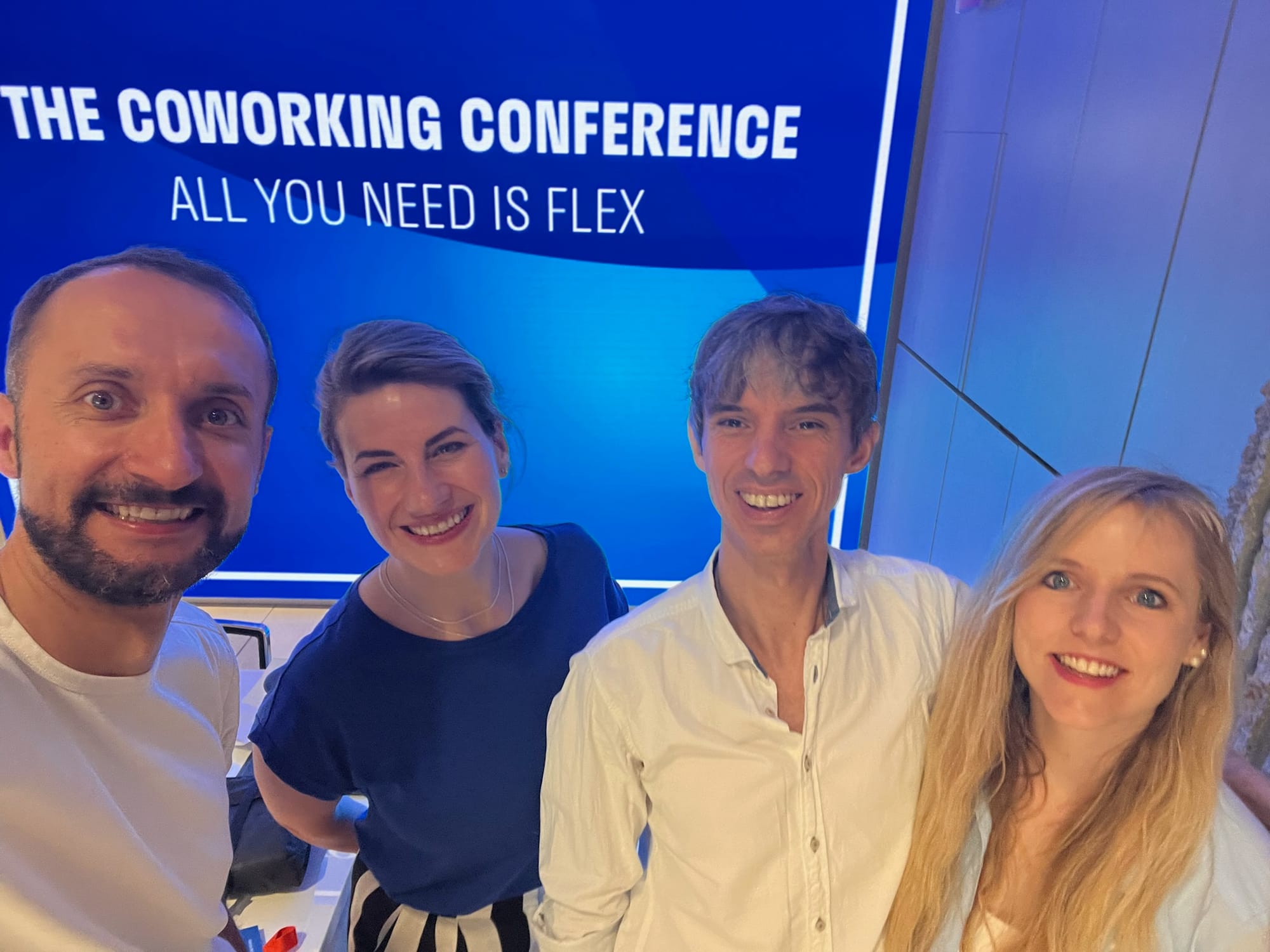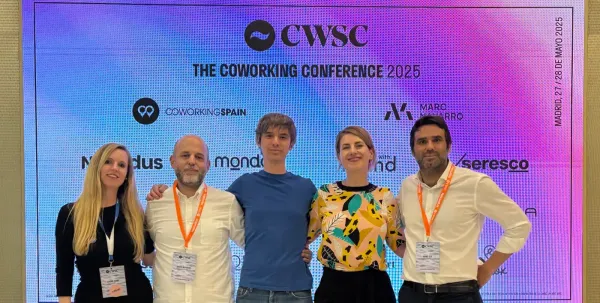Day 2 of the Coworking Spain Conference 2024 in Madrid was full of insights and inspiration. It explored how coworking spaces are changing the traditional office environment to encourage collaboration, creativity, and community.
We at Cobot were excited and eager to return for the second day of this vibrant gathering, with our Chief Product Officer, Kristina Schneider, sharing her expertise as one of the event's speakers that day.
Starting with Francisco Vázquez's exploration of evolving office culture and progressing onto Claire Carpenter's learnings from challenges, the key takeaways from the day were as follows:
Francisco Vázquez: Transforming Office Culture
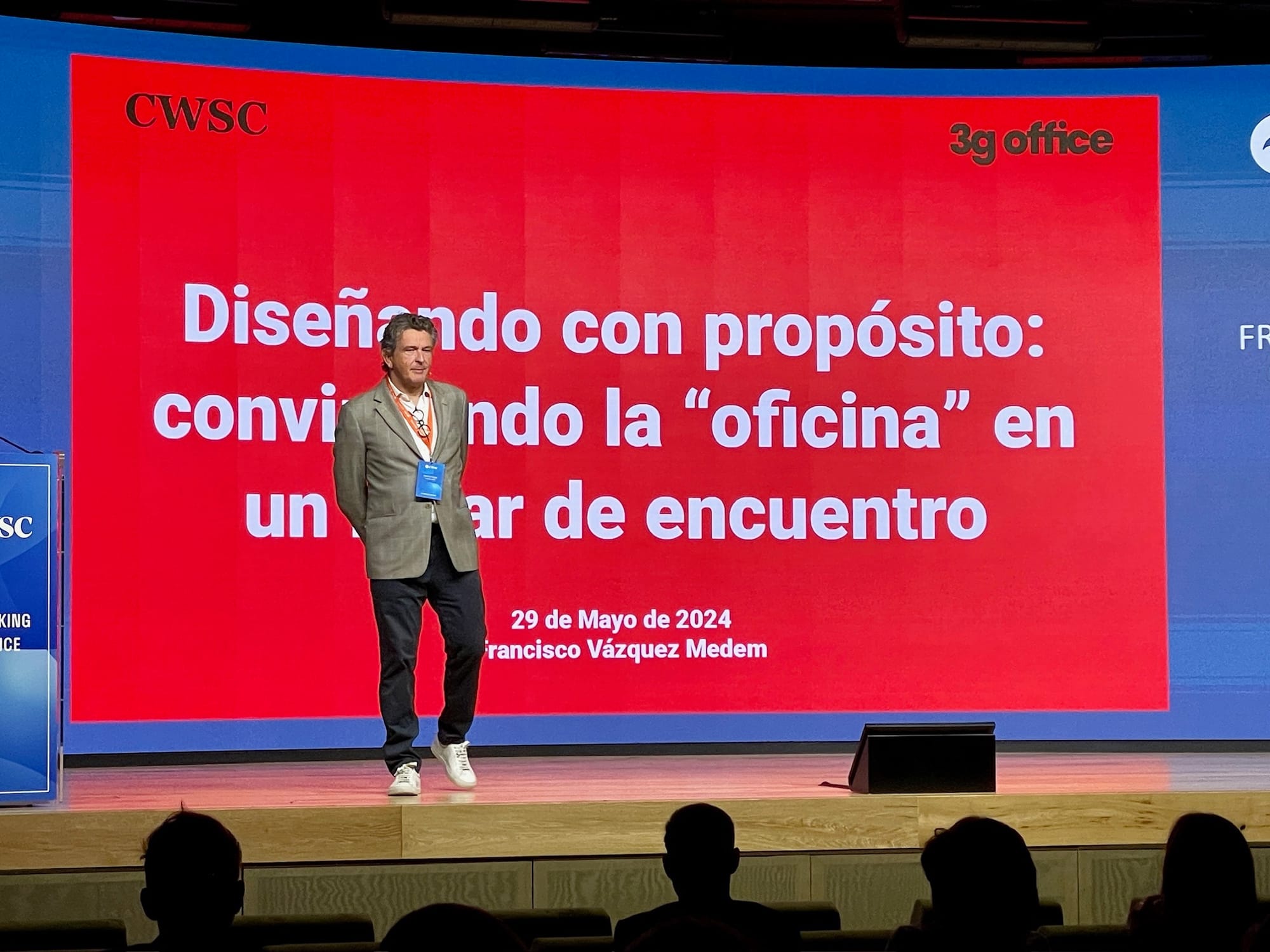
Francisco Vázquez, founder and president of 3g Smart Group, shared his insights on how office spaces are transitioning beyond traditional work environments into hubs for socialization and collaboration. The concept of work has shifted from being tied to a specific location to becoming an activity that can happen anywhere; as a result, flexible and hybrid models become the norm. This new approach allows for greater autonomy and a better work-life balance.
Vázquez highlighted how modern workspaces are part of a broader ecosystem that includes home offices, coworking spaces, and cafes, each serving different needs. While remote work is on the rise, physical presence remains valuable for building relationships.
As a result, office design is shifting from rows of desks to spaces that encourage collaboration and co-creation. Coworking spaces, in particular, are emerging as key meeting places, blending community with functionality to meet the evolving needs of modern workers.
HIT Cowork: Managing Uncertainty
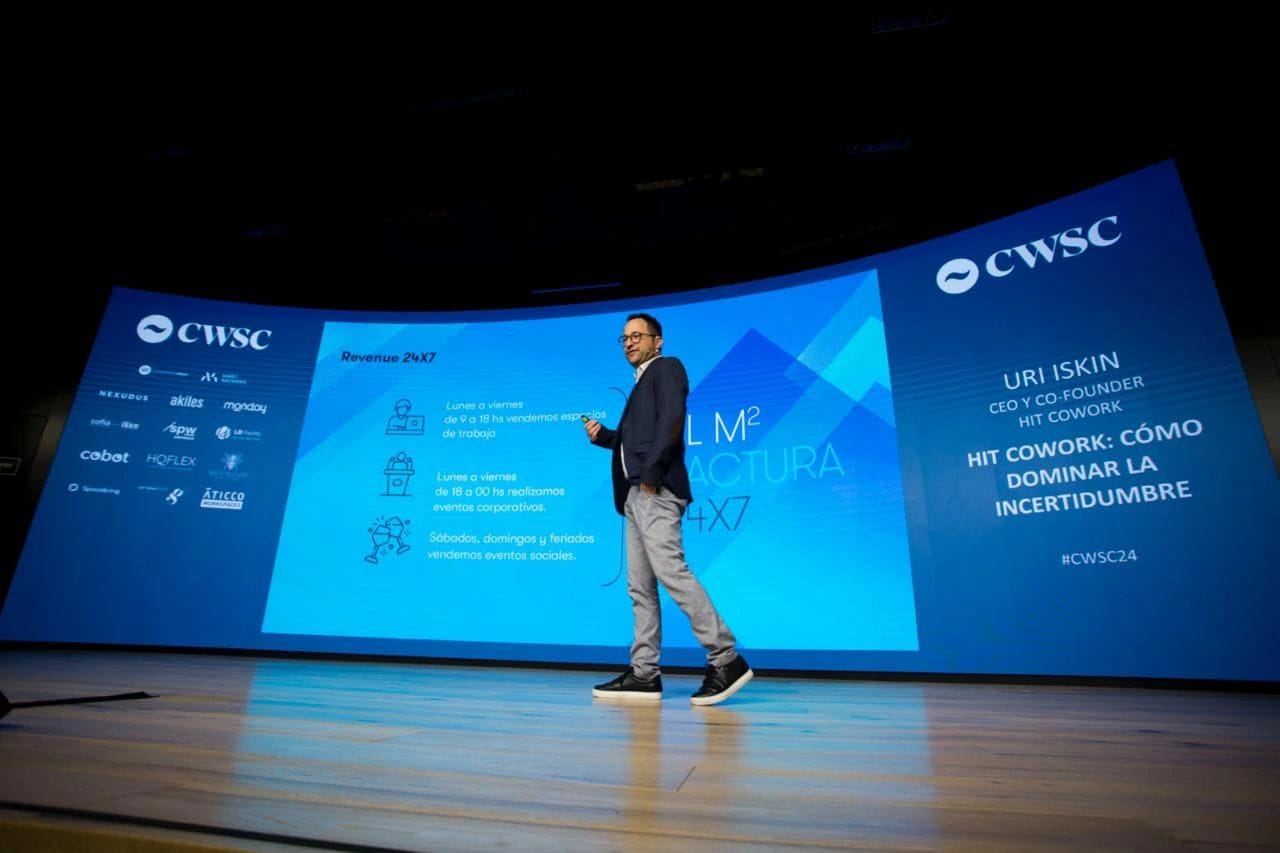
Uri Iskin, CEO & Cofounder of HIT Cowork, presented innovative strategies for navigating uncertainty and transforming how office spaces are utilized. They offer comprehensive solutions that let clients focus on what they do best—their business. Here’s what they shared:
- All-Inclusive Solutions: By providing a full suite of services, HIT Cowork allows clients to concentrate on their core activities without worrying about the logistics of managing a workspace.
- Custom Spaces: For corporate clients, HIT Cowork offers tailored spaces that meet specific needs, ensuring a personalized and efficient work environment.
- Expanding Services: With initiatives like HIT Studio for hybrid events and HIT Café for social gatherings, they continually explore new ways to add value and enhance the coworking experience.
- New Revenue Streams: They’ve found success in monetizing their spaces outside regular working hours through corporate events and social activities, maximizing space utilization and boosting profitability.
- Part-Time Offices: HIT Cowork’s flexible office rental options cater to businesses looking for adaptability, helping them make the most of their workspace.
One vs. All: Gabriel Espín Ordas' Q&A
Gabriel Espín Ordas kept the audience engaged with a rapid-fire Q&A session. Marc asked anonymous questions from the audience, resulting in honest insights into the coworking industry. Gabriel, CEO and Cofounder at Aticco, highlighted the importance of making coworking spaces flexible and innovative. He pointed out that many spaces remain too rigid to meet the changing needs of today’s workers.
Gabriel gave unfiltered assessments of his competitors, acknowledging their strengths and areas for improvement. He praised those creating lively coworking communities while encouraging others to enhance their service offerings and customer experience. Asked about hard-learned lessons from his job leading Aticco Workspaces, Gabriel admitted:
One of our biggest mistakes was that we implemented a coworking management software too late, it would have been wise to do it earlier.
Mission, Passion, and Profitability
Erika Meyer, Raquel Traba Galisteo, and Maurici Alkain Adroer led a thought-provoking discussion on the balance between profitability and social impact within coworking spaces. Here’s what they shared:
- Erika Meyer (Espacio Geranios): Erika emphasized the power of human connections and the positive impact coworking spaces can have on their communities. By raising €100,000 through community investment, she demonstrated the power of coworking spaces to drive social change.
- Maurici Alkain Adroer (Manglar): Maurici discussed his focus on local residents over digital nomads and the importance of offering diverse revenue streams. He highlighted that 50% of Manglar’s revenue comes from non-coworking activities, stressing collaboration with local businesses over competition and the need to provide affordable options that add value to the neighborhood.
Panel: The Future of Coworking Software
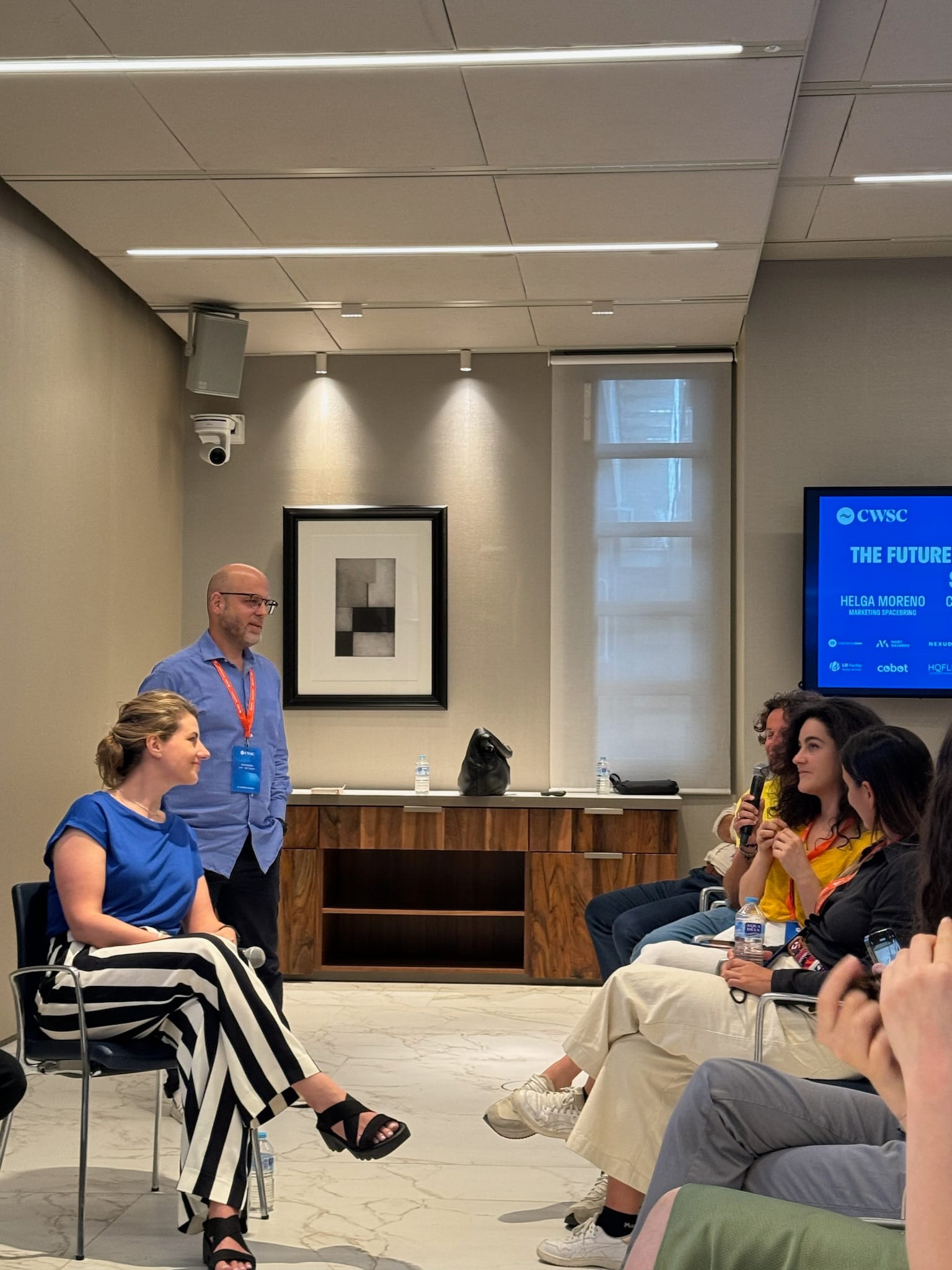
Our Chief Product Officer, Kristina Schneider, at Cobot, shared her insights on how Cobot continues to evolve to meet the changing needs of coworking spaces.
- Integration and Flexibility: Flexibility remains a cornerstone of Cobot’s approach. The platform supports integrations through tools like Zapier and is open-source, allowing coworking spaces to create custom workflows. "Our system can handle it if two software solutions need to work together," Kristina explained.
- Enhancing Member Experience: Cobot’s vision is to make the software almost invisible, enabling users to enjoy the space and community without being bogged down by technology. "We want people to enjoy the spaces and community without spending hours trying to open a door or contact admins," Kristina elaborated. By integrating with devices and apps that people already use, Cobot ensures that technology serves the space without getting in the way.
- Global Expansion Challenges: While Cobot sees growth potential in markets like Latin America, we are mindful of the challenges related to integration and taxes. We’re open to exploring these opportunities as they align with our mission.
- Empowering Innovation in Coworking: Cobot views coworking software providers as partners. Through open communication and collaboration, we tailor our solutions to meet the specific needs of each space, ensuring successful and rewarding partnerships.Cobot’s mantra is to empower operators to quickly launch new services without being constrained by technology. Kristina emphasized the importance of collaboration, especially in areas like door lock systems where integration can be fragmented. "Our goal is to make it easier and faster to launch new services’’ she said.
Through Kristina’s insights, it’s clear that Cobot is committed to supporting coworking spaces as they innovate and adapt to the industry's evolving demands.
Learning from Challenges
Claire Carpenter, a pioneer & consultant in coworking and social impact, shared her insights on strategic partnerships, team management, and building processes for long-term success. Her experiences offer valuable lessons for coworking operators, particularly those new to the industry or facing similar challenges:
- Strategic Partnerships: Claire emphasized finding partners who align with long-term goals and can support sustainable growth.
- Team Management: She highlighted the importance of having the right team in place and managing performance over time to achieve desired outcomes.
- Building Slack and Time: Allowing for flexibility and investing in effective processes is crucial for adapting to change and seizing new opportunities.
- Human Potential: Claire underscored the value of maximizing human resources and fostering personal growth within the team.
Lessons from LATAM Coworking
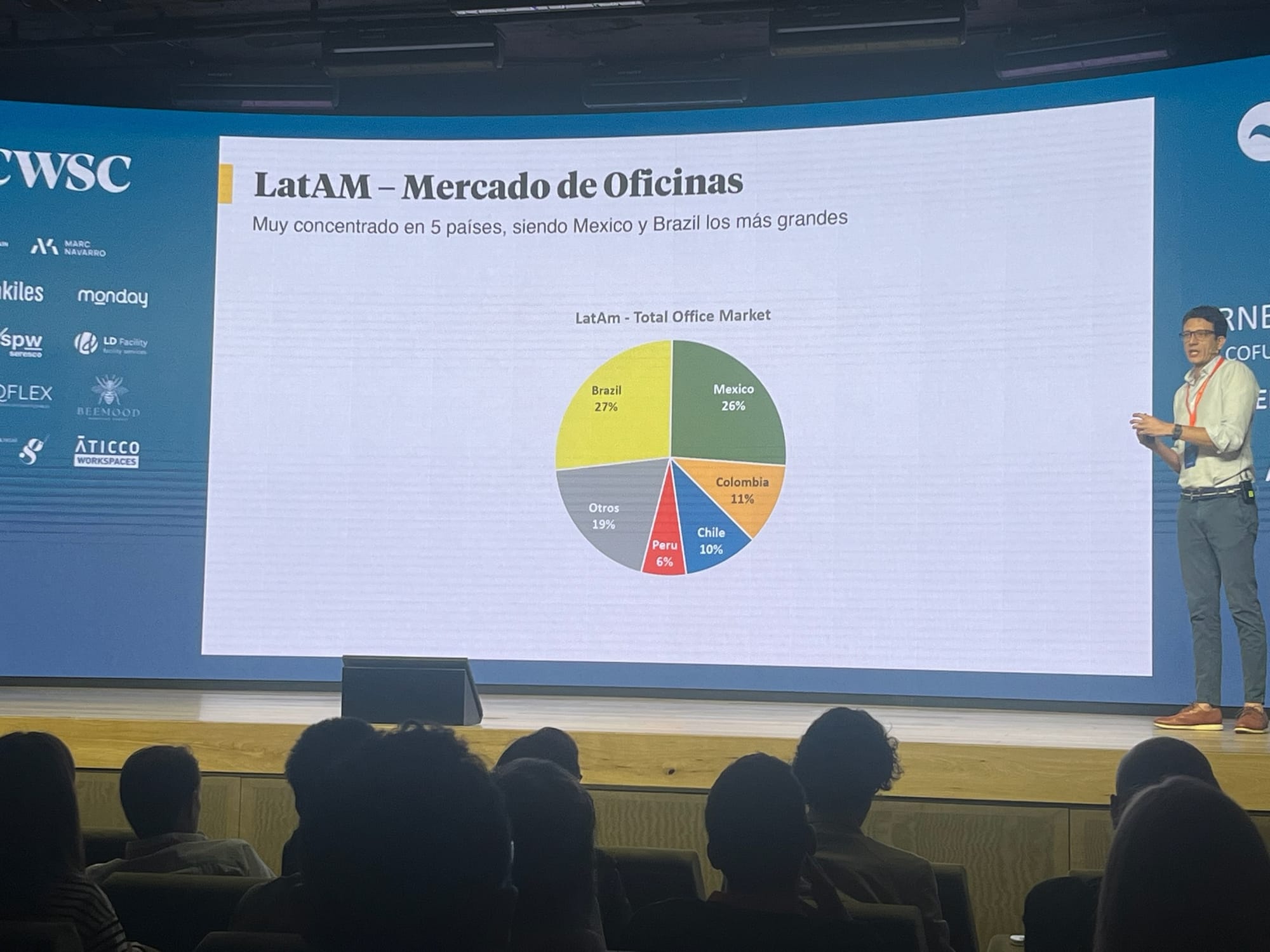
The Latin American coworking market is booming, particularly in Brazil, indicating a bright future for coworking in the region. Key insights included:
- Growth in Brazil: With 4000 coworking spaces and 1200 in São Paulo alone, Brazil is witnessing rapid expansion.
- Post-Pandemic Changes: The shift from open spaces to private offices is driven by global corporations downsizing local headquarters.
- Corporate Events: Coworking spaces are now a popular venue for corporate events. These events can make up to 30% of their total revenue during busy times. This shows that people are using coworking spaces for more than just daily work.
- Community as a Service (CaaS): Building strong communities and offering all-inclusive services are essential for enhancing the workplace experience.
Additionally, Brazil has also attracted significant venture capital investment, with 375 venture capital rounds totaling USD 3.1 billion in the first half of 2022. This shows that investment is up in Brazil's growing startup ecosystem as investors see the potential for innovation and expansion across various sectors, including coworking.
Reference: Latin America Coworking Spaces Market Insights. (n.d.). Mordor Intelligence
Embracing the Future of Coworking
Day 2 of the Coworking Spain Conference 2024 showed how coworking spaces are changing and growing. Francisco Vázquez talked about new ways office culture is shifting, and Kristina Schneider shared Cobot's perspective on how coworking software is evolving. The main points were clear: being flexible, building strong communities, and using technology are key to success.
As coworking spaces continue to change the traditional office setup, it's important to adopt flexible work models and use technology effectively. The conference highlighted how designing spaces that encourage teamwork, meet different needs, and build meaningful connections is essential for the future.
Ready to transform your coworking vision into reality?
Join us at Cobot to learn more about how our solutions can help you create a vibrant coworking community. Sign up for a free demo today and discover the future of coworking management with Cobot!
